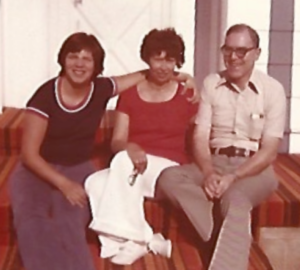In the 1960s and 1970s, Kansas, a state that derived its name from Indigenous Americans (the Kansa, or Kaw, of eastern Kansas and Oklahoma), was a predominantly mono-cultural place. The small town in western Kansas where I was raised was much the same. There were no Native Americans living there (that I knew of, since it wasn’t talked about), and there was no internet or resource to let people know of and understand anyone “other,” which just meant “not Caucasian.”
 At that time in the Midwest, anything different from the dominant culture was not “a thing.” I wasn’t exposed to Native American culture or events – I had never even HEARD of a pow-wow. We still played “Cowboys and Indians,” and recited “10 Little Indians” with construction paper headdresses and tomahawks in school. It wasn’t “popular” to claim Native American heritage, but, from an early age, I was fascinated; it felt “exotic.” When I wasn’t fantasizing that my father was Cary Grant and my mother was the Queen of England, I would think of myself as an Indian Princess, but I don’t think I ever let anyone know.
At that time in the Midwest, anything different from the dominant culture was not “a thing.” I wasn’t exposed to Native American culture or events – I had never even HEARD of a pow-wow. We still played “Cowboys and Indians,” and recited “10 Little Indians” with construction paper headdresses and tomahawks in school. It wasn’t “popular” to claim Native American heritage, but, from an early age, I was fascinated; it felt “exotic.” When I wasn’t fantasizing that my father was Cary Grant and my mother was the Queen of England, I would think of myself as an Indian Princess, but I don’t think I ever let anyone know.
There were essentially NO open adoptions back then, but there was never a time in my life when I DIDN’T know that I was adopted. The Campbells were open about my adoption in that they told me that I was adopted and that my birth mother told the adoption agency that I had “Indian blood,” but beyond letting me know that I was part Native, I was told very little.
 Any emotions about my adoption and ethnicity were pushed down after a series of health issues in the family, starting with my father’s brain tumor when I was 12 years old, and my mother’s death from cancer when I was 17. At the time, it felt like bringing it up would be a betrayal, but I now understand that feeling came from me, from my trauma about my parents’ health issues, not from my mother or father. As a result, my birth mother’s name remained unknown to me until I was in my late 20s/early 30s. That was when I took the big step and requested my unamended birth certificate from the State of Kansas Department of Vital Statistics. With that I knew her name, I knew that she was 26 years old when she had me, and I knew that she was from Oklahoma, but not much more.
Any emotions about my adoption and ethnicity were pushed down after a series of health issues in the family, starting with my father’s brain tumor when I was 12 years old, and my mother’s death from cancer when I was 17. At the time, it felt like bringing it up would be a betrayal, but I now understand that feeling came from me, from my trauma about my parents’ health issues, not from my mother or father. As a result, my birth mother’s name remained unknown to me until I was in my late 20s/early 30s. That was when I took the big step and requested my unamended birth certificate from the State of Kansas Department of Vital Statistics. With that I knew her name, I knew that she was 26 years old when she had me, and I knew that she was from Oklahoma, but not much more.
Then, fast-forward a few years, while living in California, I attended my first pow-wow! Oh, what an experience THAT was…the singing, the chanting, the drumming, the dancing – I felt it in my heart, in my stomach, my bones, in my very being!
And so began my journey to REALLY know myself!
Stay tuned for Part 3, of a multi-part blog of the origins of Five Tribes Therapy, and me.
